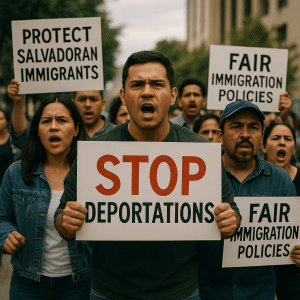El Salvador deportation case developments and their impacts
The El Salvador deportation case highlights significant challenges faced by Salvadoran communities, with human rights organizations advocating for fair policies and potential reforms in immigration law to ensure protection for vulnerable populations.
El Salvador deportation case developments continue to shape the landscape of immigration in the region. As policies evolve, many families find themselves caught in a complex web of legal challenges and uncertainty. How do these changes affect everyday lives?
Background on the El Salvador deportation case
The background on the El Salvador deportation case is crucial to understanding the broader implications of immigration policy in the United States. This case has emerged as a focal point in discussions about the treatment of Salvadoran immigrants and their rights.
Initially sparked by increasing evidence of violence and persecution in El Salvador, the situation has prompted many Salvadorans to seek asylum in the U.S. A significant factor in this case has been the role of gang violence, which has made life in some areas of El Salvador incredibly perilous.
Key Factors Influencing the Case
There are several critical elements shaping the El Salvador deportation case:
- Historical context: The long history of civil conflict in El Salvador has led to massive displacement of its citizens.
- Current immigration policies: Changes in U.S. immigration law directly affect Salvadoran immigrants seeking refuge.
- Legal battles: Many individuals have been caught in lengthy legal proceedings regarding their status.
As these factors intertwine, the challenges faced by Salvadoran immigrants become increasingly complex. The impact on families can be devastating, as loved ones are separated or face uncertainty about their future.
Community Responses
In response to these challenges, various community organizations are stepping up to assist those affected by the deportation case. They provide resources, legal aid, and support networks, helping individuals navigate the complex immigration system. This grassroots effort plays a significant role in offering hope and assistance to those facing deportation.
Understanding the El Salvador deportation case is essential not only for the individuals involved but also for shaping public opinion and potential policy changes in the future. The ongoing developments underline the need for compassion and comprehensive reform that addresses the root causes of displacement.
With a clearer grasp of the background of this case, we can continue to explore its ramifications and the human stories within it.
Recent legal developments in the case
The recent legal developments in the case have brought significant changes to the landscape of immigration law. Courts have been actively involved in examining various elements of the case, leading to new rulings that may affect the lives of many Salvadorans.
In the past few months, several court decisions have highlighted the necessity for justice in handling immigration matters. These rulings can create pathways for many affected families seeking asylum and protection from deportation.
Key Legal Changes
Some of the most important updates include:
- Changes in legal definitions: Courts are redefining what it means to qualify for asylum based on current conditions in El Salvador.
- Increased scrutiny of deportation processes: There is growing demand for fair treatment and proper legal representation for Salvadoran immigrants.
- New appeals processes: More options are becoming available for individuals seeking to challenge deportation orders.
These legal changes aim to improve the rights and protections available to Salvadorans, making it clear that their situations deserve humane consideration. Many advocates are pushing for reforms that ensure fair practices in the immigration system.
Impact on Immigrants
The impacts of these legal developments are profound. Families are experiencing renewed hope as new rulings provide opportunities to halt deportations. This creates a ripple effect within communities, where many residents rally support for one another in these trying times. Transitioning from fear to a sense of security is paramount for those involved.
With ongoing developments, the situation remains dynamic. As lawyers and activists continue to advocate for change, it is essential to stay informed about how these legal advancements affect the wider context of immigration.
Impact on Salvadoran communities
The impact on Salvadoran communities from the ongoing deportation case is profound. Families are experiencing significant changes in their daily lives as they navigate the uncertainty surrounding immigration laws.
Many individuals within these communities have close relatives facing deportation, which heightens anxiety and fear. This situation places immense emotional and financial strain on families as they consider the potential loss of loved ones.
Social Effects
In addition to personal turmoil, there are wider social implications:
- Community networks: These networks often provide essential support, helping families cope with legal battles and emotional distress.
- Educational impacts: Children in these families may face challenges in school due to stress, leading to difficulties in concentration and performance.
- Economic repercussions: Loss of income from deported workers can destabilize households and affect the economic health of local areas.
This interconnectedness highlights the way that immigration policies do not only impact individuals but also weave through the fabric of entire communities.
Resilience and Response
Despite these challenges, Salvadoran communities are showing incredible resilience. Many community organizations have stepped in to provide resources and advocacy. These groups work tirelessly to educate families about their rights and provide legal assistance. Local residents often come together to organize events aimed at raising awareness and supporting those affected by deportations. This solidarity fosters a sense of hope amidst uncertainty, as community members unite for a common cause.
The ongoing situation underscores the importance of addressing the needs of these communities in policy discussions. Understanding their struggles is essential to creating effective solutions for the future.
Responses from human rights organizations

The responses from human rights organizations regarding the El Salvador deportation case have been both urgent and organized. These organizations play a critical role in advocating for the rights of Salvadoran immigrants, highlighting the need for protection from unjust deportation.
As the situation unfolds, various human rights groups have mobilized efforts to support affected individuals and families. Their activism focuses on ensuring that the rights of immigrants are recognized and respected within the legal framework.
Advocacy Efforts
Key actions taken by these organizations include:
- Public awareness campaigns: Many groups produce materials that inform the public about the struggles faced by Salvadoran immigrants.
- Legal support: Providing legal assistance to help individuals navigate the complicated immigration process is a primary focus.
- Lobbying for policy changes: Human rights organizations are actively lobbying lawmakers to construct more humane immigration policies that consider the challenges faced by immigrants.
Through these efforts, human rights organizations seek not only to defend individual cases but also to promote systemic change that benefits entire communities.
Collaborative Initiatives
In addition to their independent actions, these organizations often collaborate with local advocacy groups to amplify their impact. By uniting efforts, they create a stronger voice that resonates more profoundly with decision-makers. Collaborative initiatives also foster community solidarity, bringing together individuals from various backgrounds who share common goals. This teamwork enables more significant outreach and support for those facing deportation.
Ultimately, the energetic responses from human rights organizations underscore the critical importance of advocacy in protecting the rights of vulnerable populations. Their ongoing commitment serves as a beacon of hope for Salvadoran communities affected by deportation policies.
Future implications for immigration policy
The future implications for immigration policy are shaped by the ongoing challenges highlighted by the El Salvador deportation case. As legal battles continue and community responses evolve, both policymakers and advocates are watching closely.
Changes in policy could lead to new pathways for immigrants, especially those from high-risk regions like El Salvador. The emphasis on humane treatment and the recognition of the needs of individuals and families may become central themes in future discussions.
Potential Policy Changes
The landscape of immigration policy may see significant updates, which could include:
- Reform of asylum processes: Simplifying procedures to help Salvadorans fleeing violence access protection more easily.
- Increased legal protections: Introducing laws that safeguard the rights of immigrants throughout their legal journey.
- Community-based support programs: Expanding initiatives that assist immigrants in navigating the complex immigration system.
These potential changes could reshape the future of immigration law, making it more responsive to the needs of those affected by policies and violence in their home countries.
Broader Impact on Society
As immigration policies evolve, the implications reach far beyond individual cases. Communities across the United States may experience shifts in demographic makeup, cultural exchanges, and economic contributions. Salvadoran immigrants, like many others, bring valuable skills and perspectives that enrich their communities.
Furthermore, as acknowledgment of humanitarian crises increases, so does the possibility for collaborative efforts between states and local organizations to address immigration issues. This teamwork is essential in creating a cohesive strategy that supports the well-being of immigrants while also addressing public concerns.
Overall, the developments in the El Salvador deportation case could serve as a catalyst for meaningful change in immigration policy, fostering an environment where families can thrive without fear.
In summary, the developments surrounding the El Salvador deportation case highlight the urgent need for change in immigration policy. The impact on Salvadoran communities is significant, as families face uncertainty and challenges. Human rights organizations play a crucial role in advocating for these individuals, pushing for policies that ensure protection and fairness. As we look to the future, ongoing legal discussions may shape a more humane immigration system that respects the rights and dignity of all. By acknowledging these issues, we can work together toward solutions that support families and foster compassionate communities.
FAQ – Frequently Asked Questions about the El Salvador Deportation Case
What is the current status of the El Salvador deportation case?
The case is ongoing, with recent legal developments aiming to protect Salvadoran immigrants from unjust deportation.
How are Salvadoran communities impacted by deportation policies?
Deportation policies create uncertainty and stress for families, affecting their emotional and financial stability.
What role do human rights organizations play in this issue?
Human rights organizations advocate for fair treatment of Salvadoran immigrants and push for changes in immigration laws.
What potential changes could occur in immigration policy?
Future policies may include reforms that simplify asylum processes and provide better protections for immigrants.





